Wasps may be beneficial pollinators and pest killers, but they can be frightening and annoying if there are too many in your yard. So, if you want to keep wasps at bay without killing them, using plants as insect repellents is an excellent idea.
Some of the most effective plants that repel wasps are peppermint, citronella, eucalyptus, and wormwood. To use, simply transform these plants into oil then apply in areas frequented or can be potentially visited by wasps.
Let’s talk more about the plants that wasps hate and how you can use them to repel pests. This article will also discuss some plants that attract wasps and what kind of plants they pollinate.
What Repels Wasps?
Intensely fragrant plants repel wasps. Since these insects have a keen sense of smell, some herbs are so aromatic that wasps cannot smell anything else in the area, prohibiting them from finding food or detecting predators.
Wasps pick up on different scents through receptor neurons in their antennae, giving them a highly accurate reading of the types of animals, plants, and insects around them.
For wasps, having their good sense of smell blocked by fragrant plants may be life-threatening since they use it to locate partners, enemy wasps from other colonies, predators, and food sources.
Plants That Keep Wasps Away
The most effective plants at keeping wasps away are herbs such as peppermint, citronella, eucalyptus, and wormwood. Each of these is very fragrant and will help to hide the scent of your sweeter flowers.
Using a chemical pesticide on wasps can be both intimidating and harmful for the plant life around your home. So, repelling them naturally with plants is one of the best ways to control wasps.
Will Peppermint Plants Keep Wasps Away?
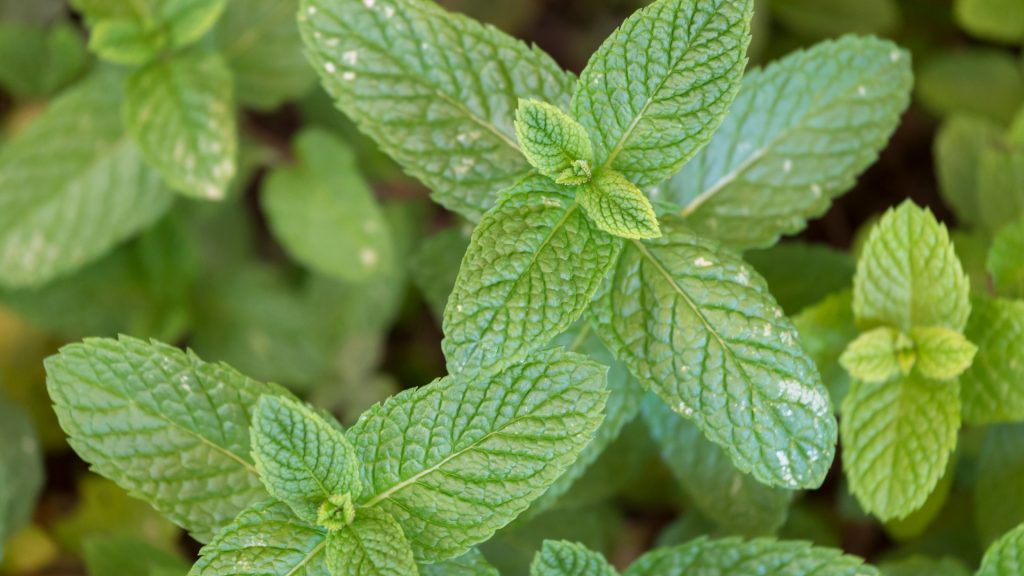
According to a study from the Society for Chemical Industry, peppermint oil keeps wasps and yellowjackets away. Wasps will avoid landing on peppermint plants due to their intense smell, but just having a peppermint plant in your yard will not eliminate wasps.
If you want to repel wasps and yellowjackets actively, you need to crush some mint leaves to release the strong-smelling oils that make this plant so unattractive to insects. Usually, mint oil is only effective at repelling insects for a few hours at a time, so you need to reapply mint to problem areas regularly.
When you use peppermint oil or keep peppermint plants in your garden, you aren’t just repelling wasps. Peppermint oil also repels mosquitoes, rodents, flies, beetles, aphids, and many other pests. So, with peppermint, you can cover all of your pest-control bases.
Tips for Growing Peppermint
Mint is one of the easiest plants to grow. They prefer full sun, but they can survive in partial shade. Keep peppermint in pots if you don’t want a large patch since it spreads quickly.
Does Citronella Plant Repel Wasps?
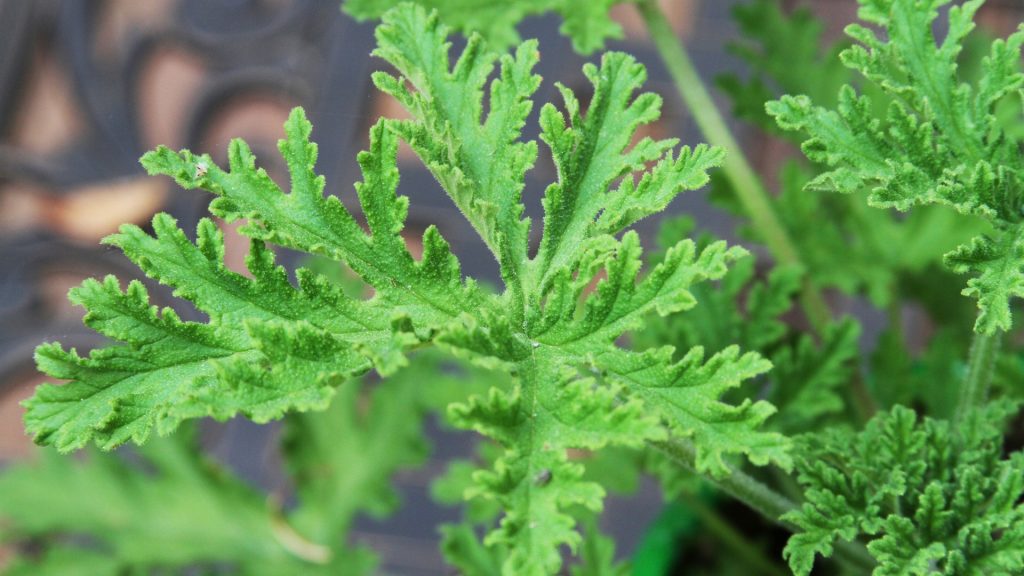
Yes, not only that but it also repels yellowjackets, mosquitoes, flies, and many other pests according to several studies. Like peppermint, citronella will not repel wasps by just sitting in your garden. You will have to release the fragrant oils for citronella to repel insects effectively.
It is important to note that most pest-control professionals do not recommend using a citronella candle as your primary defense against insects since they are only 14% as effective as DEET bug sprays. In comparison, citronella oil diffusers are 68% as effective as DEET.
So, as is the case with all plants, crushing the leaves to release oils is your best chance if you want to repel any insect, including wasps.
Tips for Growing Citronella
Citronella is a perfect indoor plant for windows to deter pests since it grows best in partial shade. That means that you should ensure that it gets at least 6 hours of sunlight every day. Citronella needs 12 to 24 inches of space and well-draining soil to stay healthy.
Do Eucalyptus Plants Repel Wasps?
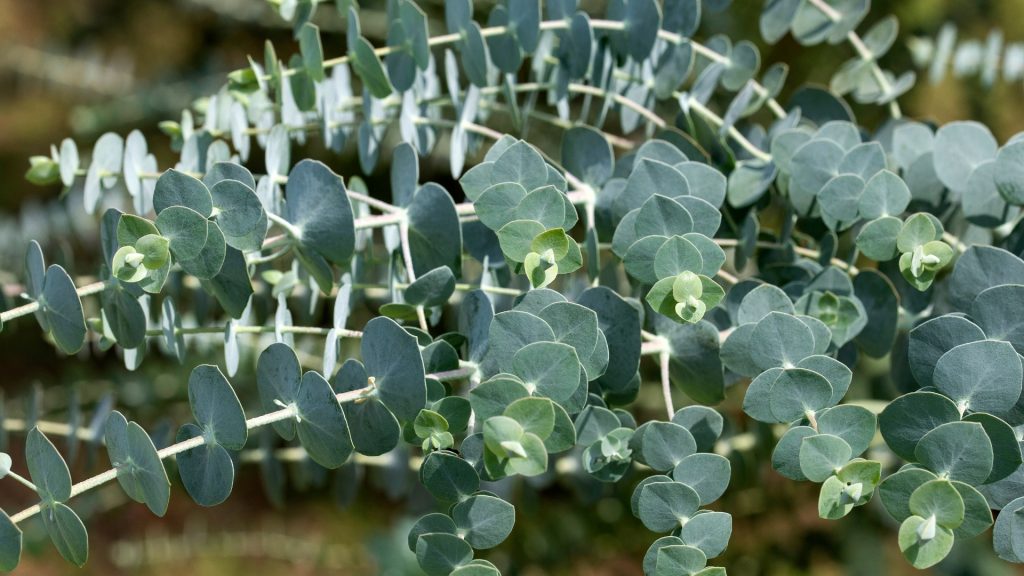
Eucalyptus is another great-smelling herb that has been scientifically proven to overwhelm wasps and repel them. It is so effective that the CDC recently approved of eucalyptus as a suitable alternative to DEET, which repels wasps, yellow jackets, and a broad spectrum of other bothersome pests.
Tips for Growing Eucalyptus
Because eucalyptus is a slow-growing plant, you may want to purchase one that has already matured from your local garden center. It prefers full sun and drought conditions. That means that it is sensitive to overwatering, and you will need to ensure that the soil is dry before you give it a good soaking.
Do Wormwood Plants Keep Wasps Away?
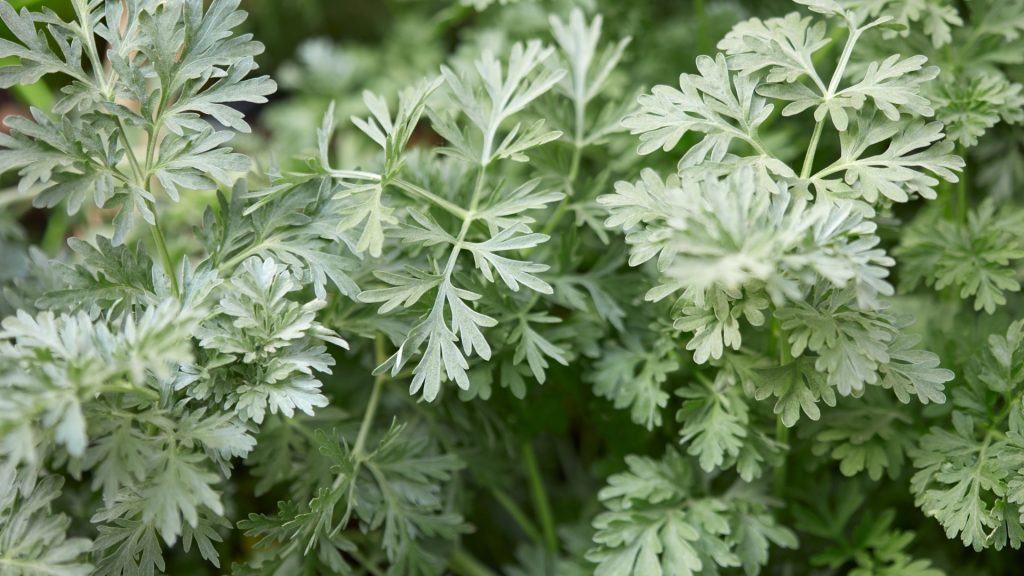
Wasps and other insects with powerful senses of smell are repelled by the musky, woody scent of absinthe in wormwood plants. Absinthe is a sticky oil, so it lingers even after the plant has died. That makes wormwood an effective killer of insects and larvae that live beneath your other plants.
Tips For Growing Wormwood
Wormwood is a shrub that requires full sun and well-drained soil. If you want to grow it in your garden, you need to find an isolated spot or put it in a container since wormwood can slow the growth of other plants near it.
Using Plants to Make Your Own Wasp and Bug Repellents
Because most plants can only repel wasps if their oils are released, this section describes how to produce repellent using home-grown herbs to keep wasps, mosquitoes, flies, and other insects away from your house.
You can use herbs to make peppermint and eucalyptus wasp spray, bug-repellent incense bundles, and citronella sachets.
DIY Wasp Spray
You may use peppermint to produce mint bug spray, which you can spray on wooden furniture, woodpiles, yourself, and plants that wasps frequently land on.
To make peppermint bug spray:
- Step 1: Dry around four sprigs of peppermint and two eucalyptus leaves or dehydrate them in an oven or dehydrator.
- Step 2: Fill an empty, clean spray bottle ¼ of the way with your dried herbs.
- Step 3: Fill the spray bottle with rubbing alcohol, witch hazel, or high-proof vodka.
- Step 4: Let the mixture steep in a sunny window for 3 to 5 days.
- Step 5: Use a strainer or tea towel to strain the mixture and remove the mint.
- Step 6: Put your bug spray liquid back into the spray bottle and use it whenever you want to repel insects.
DIY Bug-Repellent Incense Bundle
You may also want to consider burning dried mint to repel insects when you are outside. Wasps don’t like smoke, and mint-scented smoke is extra powerful at repelling pests.
To make a mint smudge bundle for repelling wasps:
- Step 1: Dry or dehydrate around five sprigs of mint.
- Step 2: Use a cotton or hemp string to tie the dried mint into a bundle.
- Step 3: Put at least an inch of salt or sand into a ceramic, metal, or terracotta dish.
- Step 4: Ignite the mint with a candle flame or lighter and place it in the dish.
- Step 5: Let it burn near you while you are outside to repel wasps, flies, mosquitoes, and other insects.
DIY Citronella Window Sachets
Keeping citronella by your windows will keep bugs out and good smells indoors.
To make bug-repellent citronella sachets to put by your windows, in your pocket, over your doors, or near wasp nests:
- Step 1: Pick some fresh citronella.
- Step 2: Grab a tea towel, cotton bag, or piece of fabric.
- Step 3: Put the citronella in the bag or the fabric’s center.
- Step 4: Starting from the bottom edge, tightly roll the fabric around the citronella.
- Step 5: Wring your rolled cloth, crushing the citronella inside, and releasing all of its fragrant oils.
- Step 6: Place the sachet on your windowsill or anywhere you want to keep wasps, mosquitoes, flies, and other pests at bay.
Plants That Attract Wasps
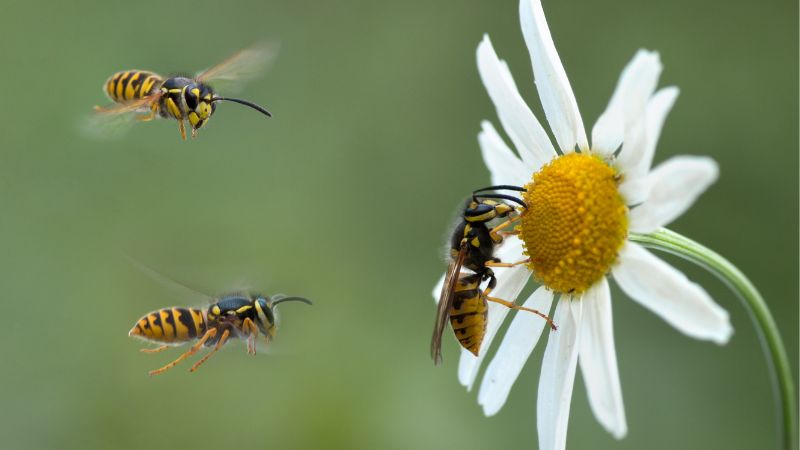
If you want to get rid of the wasps living around your home, you may need to move some of your plants. They are especially attracted to fragrant flowers, vegetables, and fruits.
If you cannot get rid of your wasp-attracting plants, you might want to switch to planting one of the wasp-repelling ones next to it to keep wasps at bay.
Fragrant Flowers
Wasps are attracted to nectar, so they gravitate towards brightly-colored, sweet-smelling flowers. However, they do not like red flowers, and marigolds can also poison them. Additionally, spicy-scented chrysanthemums produce pyrethrum, a powerful insecticide that will deter wasps and other insects.
Vegetables
Since wasps are predatory, they are always likely to land on plants with plenty of pests crawling on them. Wasps use their sense of smell to find aphids, slugs, beetles, and other insects that eat vegetables.
So, naturally, vegetables like tomatoes, cabbage, lettuce, and squash are ideal places for wasps to hunt for their next meal.
Fruits
Fruit trees and plants like melons and berries are also common places where wasps look for their prey. That’s because some flies may lay their eggs in fruit, and beetles often hide beneath the leaves. Wasps also eat sugary foods, so fruit is one of their favorite meals.
Related: What Do Wasps Eat? | Information & Facts
Do Wasps Pollinate Plants?
Yes, they are pollinators, although they are not as efficient as butterflies and bees. However, many farmers and gardeners encourage wasps to live nearby since they kill pests and pollinate their plants.
Related: Do Wasps Make Honey? | How Do Wasps Eat and Their Eating Habits
What Plants Do Wasps Pollinate?
Wasps pollinate as they hunt for insects to eat and drink nectar from flowers. They prefer to pollinate vegetable and fruit plants since they eat many garden pests common in vegetable gardens.
List of Sources
American College of Healthcare Sciences. (2017). Green Cleaning: 10 Essential Oils that Naturally Repel Insects.
Centers for Disease Control and Prevention. (2018). Bees, Wasps, and Hornets.
Eaton, A. T. (2016). Controlling Wasps, Bees and Hornets Around Your Home.
Müller, G. C., et al. (2009). Efficacy of the botanical repellents geraniol, linalool, and citronella against mosquitoes.
- Bed Bug Surge 2025: How to Detect, Prevent, and Safely Eliminate Infestations in Top U.S. Cities - June 18, 2025
- Asian Needle Ants Invade US Homes: 2025 Guide to Identification, Risks, and Effective Control - June 11, 2025
- New World Screwworm Alert: How US Livestock Owners Can Prevent Outbreaks and Protect Herds [Summer 2025 Update] - June 8, 2025
